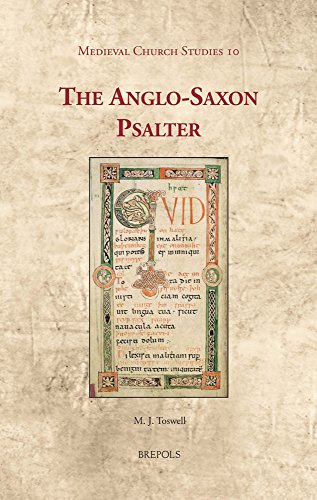Artículos relacionados a The Anglo-Saxon Psalter English: 10 (Medieval Church...

"Sobre este título" puede pertenecer a otra edición de este libro.
- EditorialBrepols
- Año de publicación2014
- ISBN 10 2503545483
- ISBN 13 9782503545486
- EncuadernaciónTapa dura
- Número de páginas470
Comprar nuevo
Ver este artículo
Gastos de envío:
EUR 43,19
De Reino Unido a Estados Unidos de America
Los mejores resultados en AbeBooks
The Anglo-Saxon Psalter (Hardcover)
Descripción Hardcover. Condición: new. Hardcover. The psalms are at the heart of Christian devotion, in the Middle Ages and still today. Learned early and sung weekly by every medieval monastic and cleric, the psalms were the language Christ and his ancestor David used to speak to God. Powerful and plaintive, angry and anguished, laudatory and lamenting: the psalms expressed the feelings and thoughts of the individuals who devised them and those who sang them privately or publicly in Anglo-Saxon England many generations later. Psalters from Anglo-Saxon England are the largest surviving single group of manuscripts, and also form a very significant percentage of the fragments of manuscripts extant from the period. Psalters were central to the liturgy, particularly for the daily Office, and were the first schoolbooks for the learning of Latin and Christian doctrine. Moreover, from Anglo-Saxon England comes the earliest complex of vernacular psalter material, including glossed and bilingual psalters, complete psalter translations, and poems based on individual psalms and on psalmic structures. The lament psalms are remarkably similar to the Old English elegies in both form and imagery, and the freedom with which vernacular adaptors of the psalms went about their work in Anglo-Saxon England suggests an appropriation of the psalter not as the sacred and unchanging Word but as words that could be turned to use for meditation, study, reading, and private prayer. Worth investigation are both individual figures who used the psalms such as Bede, Alfred, and Aelfric, and also the unknown compilers and scribes who developed new layouts for psalter manuscripts and repurposed earlier or Continental manuscripts for use in Anglo-Saxon England. In Latin and in the vernacular, these codices were central to Anglo-Saxon spirituality, while some of them also continued to be used well into the later Middle Ages. Shipping may be from our UK warehouse or from our Australian or US warehouses, depending on stock availability. Nº de ref. del artículo: 9782503545486

